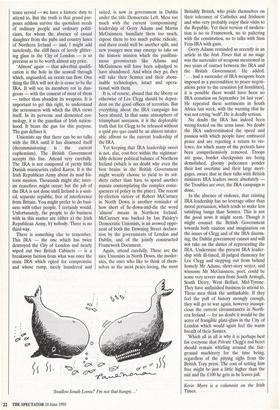HOW MANY LIVES IS LEE CLEGG WORTH?
The British press scent success in their bid to
free Private Clegg. But, argues Kevin Myers,
they may get more than they bargained for
Dublin IT IS as if we have been watching some vast fairground machinery in which thou- sands of whooping revellers are screaming as their cars hurtle through the skies and plunge through pools of water and disap- pear into deep dark tunnels, and every now and then in recent months, amid cog and cam, we have been catching a glimpse of a red beret. It is Private Lee Clegg, late of Three Para, hitherto firmly enmeshed in the big dipper of justice and politics in Northern Ireland. Is he really, as reports suggest, going to be released from that embrace?
Certainly, his plight has moved many to sympathetic oohs and aahs in Britain but almost universally in Ireland there has been silence. The fate of the wearer of the red beret moves us hardly at all. He at least is still alive, and will remain so. Our minds are on the vast machinery whirling into the skies, bearing countless souls with it. Any attempt to disentangle Private Clegg from the colossal fairground engine could imperil the thousands of shrieking riders strapped inescapably in their seats. The awful truth is that the release of Clegg, if it happens, is coming when the peace process in Northern Ireland has been at its most parlous since the cease- fires began ten months ago.
It was no doubt Private Clegg's misfor- tune — Northern Ireland nationalists would say that it is his just deserts — that the campaign to release him from life imprisonment for shooting the car thief Karen Reilly should have coincided with the ceasefires and the unresolved issue of paramilitaries jailed on murder charges. These murder convictions, for planned and coldly done killings, are of course not like the one which brought an end to Clegg's liberties — but try telling that to IRA-Sinn Fein's leaders. They have many interesting things in their kit-bags, but calm and dispassionate ratiocination on matters to do with the paras is not one of them.
Perversely, Private Clegg's presence in jail has actually been a nice little trump card for the British. While Clegg gazes at pigeons on his barred windowsill, the British Government could still piously protest the impartial virtue of its policies towards prisoners and amnesties. It now appears that it has forgotten there are things of far greater moment than Lee Clegg, who, after all, was prepared to die for his country. Since his release might well place the peace process in deadly trouble, is it so unreasonable that his country should for the time being ask a lesser and rather less permanent sacrifice of him?
Is this not getting things out of propor- tion? Why, yes, of course it is. But then the entire peace process depends on getting things out of proportion, and on the magni- fication of hope to occlude the sorry lessons of experience. For that process is based on the initial falsehood that there rests between the Unionists and Sinn Fein- IRA some so far unperceived but nonethe- less discoverable common ground, whereon they can rest their shared future and their mutual bonds of unbounded respect and affection.
This is an absurdity. But some absurdi- ties are to be encouraged, just as the belief in Father Christmas ensures good behaviour for at least a month before Christmas. People in Northern Ireland are exhausted by war and are exhilarated — to a degree which is quite astonishing — by peace. Almost anything, no matter how illu- sory, which will keep this thing called peace in place is to be welcomed. (Remember the word `almost'.) There is a price to be paid for this. Part of that is the liberty of Lee Clegg. The moment Lee Clegg is released, without a reciprocal gesture involving IRA and loyal- ist prisoners — however revolting their crimes — the entire fairground machinery could start falling apart. But, the British indicate — no handover of IRA guns, no release of IRA prisoners.
This is risky territory. Short of its war aims, one thing which the IRA takes enor- mously seriously is its prisoners. In 1921, as today, the prisoners are the key: every sin- gle IRA campaign since 1916 has involved the abandoning of both war and war aim in return for the release of prisoners.
This amnesty has become such an expec- tation within the culture of the IRA that as far back as 1971 IRA members jauntily departed for their prison cells in the fond belief that soon the amnesty would release them from most of their sentences. Indeed, the expectation of amnesty has been a fierce fuel to the IRA campaign. But this IRA campaign lasted as long as the French Revolutionary wars, and amnesty did not arrive as quickly as expected; many young men who ambled into their cells in the 1970s emerged as middle-aged men, a united, Britless Ireland as far away as ever.
Those who remain inside now still expect amnesty. Amnesty is one of the unshakable, irreducible demands of the IRA if peace is to be maintained; and keeping the peace and enjoying the frantic festivities which Belfast now giddily engages in each weekend is something most people in Northern Ireland are deter- mined on. Revellers feasting in restau- rants, boozing in bars and crossing the sectarian divide to drink in one another's clubs agree — if amnesty will give us more' of this, then give them amnesty.
It is of course too much to ask of a war- weary public, or of politicians whose politi- cal horizons do not reach beyond their own careers, to remember that the amnesty culture from the start has been a telling incentive to young men to enlist in terrorist organisations. The issuing of an amnesty now would no doubt reinforce the amnesty culture within the IRA. Just as prisoners in the 1920s, the 1930s, the 1940s and the 1960s were released after the abandonment of abortive IRA campaigns, so some future heroes might well go to war in the year 20-something in the expecta- tion that once their little existentialist exer- cise in futility is over, they can all walk free again.
One can stride up to the high moral ground and say, No more. Never again. Henceforward, a sentence given is a sen- tence served — we have a historic duty to attend to. But the truth is that grand pur- poses seldom survive the quotidian needs of ordinary people and ordinary politi- cians, for whom the absence of casual slaughter from the pubs and country lanes of Northern Ireland — and, I might add tastelessly, the cliff-faces of lovely glitter- ing glass in the City of London — is so precious as to be worth almost any price.
`Almost' again — that adverbial qualifi- cation is the hole in the seawall through which, unguarded, an ocean can flow. One thing the IRA will not do is cease to be the IRA. It will see its members rot in dun- geons — with the consent of most of them — rather than abandon its weapons. It is important to get this right, to understand the seriousness with which the IRA views itself. In its perverse and demented cos- mology, it is the guardian of Irish nation- hood. It bears the gun for this purpose. The gun defines it.
Unionists say that there can be no talks with the IRA until it has disarmed itself (decommissioning is the current euphemism). The British Government accepts this line. Attend very carefully. The IRA is not composed of pretty little Danish manicurists called Karen. It is the Irish Republican Army about its mad his- toric mission. Thousands might die; inter- im ceasefires might occur; but the job of the IRA is not done until Ireland is a unit- ed, separate republic, free of interference from Britain. You might prefer to do busi- ness with other people. I certainly would. Unfortunately, the people to do business with in this matter are either a) the Irish Republican Army, b) nobody. There is no third way.
There is something else to remember. This IRA — the one which has twice destroyed the City of London and nearly wiped out two British Cabinets — is a breakaway faction from what was once the main IRA which opted for compromise and whose rump, nicely laundered and suited, is now in government in Dublin under the title Democratic Left. Mess too much with the current 'compromising' leadership of Gerry Adams and Martin McGuinness, humiliate them too much, expose them to too much public ridicule, and there could well be another split, and new younger men may emerge to take on the historic mission which the pusillani- mous gerontocrats like Adams and McGuinness will have been adjudged to have abandoned. And when they go, they will take their Semtex and their abom- inable technologies, intact and opera- tional, with them.
It is, of course, absurd that the liberty or otherwise of Lee Clegg should be depen- dent on the good offices of terrorists. But everything about the IRA campaign has been absurd. In that same atmosphere of triumphant unreason, it is the deplorable truth that for Clegg to be released without a quid pro quo could be an almost intoler- able affront to the current leadership of the IRA.
Yet keeping that IRA leadership sweet is not, alas, cost-free within the nightmar- ishly delicate political balance of Northern Ireland (which is no doubt why even the best brains in the British Government might wearily choose to yield to its sol- diery rather than have to spend another minute contemplating the complex conse- quences of policy in the place). The recent by-election victory of Robert McCartney in North Down is another reminder of how short of lie-down-and-die the word `almost' means in Northern Ireland. McCartney was backed by Ian Paisley's Democratic Unionists, is an avowed oppo- nent of both the Downing Street declara- tion by the governments of London and Dublin, and of the jointly constructed Framework Document.
Again, attend carefully. These are the nice Unionists in North Down, the moder- ates, the ones who like to think of them- selves as the most peace-loving, the most `Swallow Jonah Lomu? I'm not that hungry...' Britishly British, who pride themselves on their tolerance of Catholics and Irishness and who very probably enjoy their visits to the Republic. Yet their version of modera- tion is no to Framework, no to paltering with the constitution, no to talks with Sinn Fein-IRA with guns.
Gerry Adams reminded us recently in an article in the Irish Times that at no stage was the surrender of weapons mentioned in two years of contact between the IRA and the British Government. He added: ... had a surrender of IRA weapons been imposed as a precondition to peace negoti- ations prior to the cessation [of hostilities], it is possible there would have been no IRA cessation on September 1st last year'. He repeated these sentiments in South Africa last week, with the warning that he was not crying 'wolf. He is deadly serious.
No doubt the IRA has indeed been wrong-footed on the arms issue. No doubt the IRA underestimated the speed and passion with which people have embraced peace and are rejecting a return to vio- lence, for which many of the pretexts have been comprehensively removed. Troops are gone, border checkpoints are being demolished, gloomy policemen ponder their lost overtime and their large mort- gages, aware that in their talks with British ministers IRA leaders swore absolutely the Troubles are over, the IRA campaign is done.
In the absence of violence, that existing IRA leadership has no leverage other than moral persuasion, which tends to make less satisfying bangs than Semtex. This is not the good news it might seem. Though it might counsel the British Government towards both caution and imagination on the issues of Clegg and of the IRA disarm- ing, the Dublin government cannot and will not take on the duties of representing the IRA. Undermine the present IRA leader- ship with ill-timed, ill-judged clemency for Lee Clegg and stepping out from behind homely Mr Adams, short-story writer, and winsome Mr McGuinness, poet, could be some very severe men from South Armagh, South Derry, West Belfast, Mid-Tyrone. They have unfinished business to attend to. These men think the unthinkable. If they feel the pull of history strongly enough, they will go to war again, however inauspi- cious the current circumstances in North- ern Ireland — for no doubt it would be the acres of frangible plate-glass in the City of London which would again feel the warm breath of their Semtex.
Which all in all is why it is perhaps best for everyone that Private Clegg's red beret should remain whirling around the fair- ground machinery for the time being, regardless of the pitying sighs from the British Tory press. The cost of setting him free might be just a little higher than the suit and the £100 he gets as he leaves jail.
Kevin Myers is a columnist on the Irish Times.




























































 Previous page
Previous page